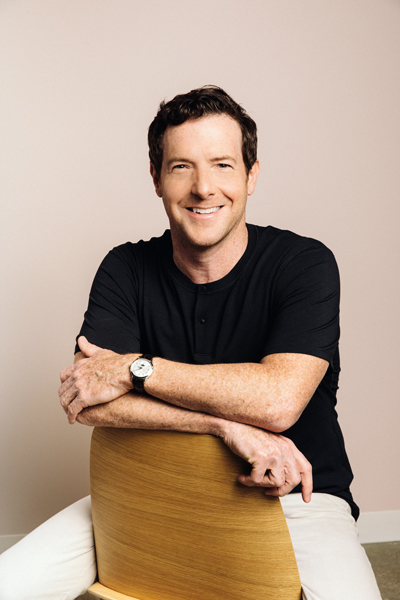In his nearly three decades as an attorney, Rob Rieders’s work has spanned industries and ranged from litigation to transactional practice. He handled securities cases at a major firm in New York City in the 1990s before returning to his native California to join a boutique law firm in beachy Santa Monica, where he represented writers, directors, producers, and actors in disputes with their networks and studios.

He spent years in entertainment law—including positions at 20th Century Fox, Lucasfilm, and Pixar—before joining app-based delivery company Postmates as general counsel four years ago. In his time there, he has worked on everything from disputes around employment law to figuring out what the future of robotics means for business. He has also hired a fleet of attorneys to tackle all that comes with being a rapidly growing company that straddles multiple industries.
A native of Irvine, California, Rieders earned a degree from the University of California Berkeley before heading to the east coast, where he graduated from the Boston University School of Law in 1991. After working in New York City for a few years, he found himself wanting to return to the west coast. A friend who worked in entertainment law told him about the benefits of working at a smaller firm, including opportunities to work more closely with clients and learn about the business side of the industry.
That led Rieders to take a job at a Santa Monica firm run by Stanton “Larry” Stein, a renowned entertainment litigator who has represented a variety of well-known Hollywood names. (Rieders once saw the cast of The Brady Bunch walk through the office, he recalls.) Eventually he craved a shift away from litigation and took a job with 20th Century Fox, working on transactional deals and then on the business affairs side, helping to put together television shows including King of the Hill, Judging Amy, and Dharma & Greg.
“It was high-paced, really fun work, including all-night negotiations to get actors signed with the studio by Monday morning. And then—boom—Monday night, they’re filming the pilot,” Rieders says.
A passion for bringing creative ideas to life is a common thread that runs through much of his work, including four years as general counsel at George Lucas’s company Lucas Digital Ltd. (which includes the famous visual effects house Industrial Light + Magic and the audio post-production studio Skywalker Sound) and eight years at Pixar Animation Studios. After leaving Pixar, he shifted gears and entered the world of tech, first at a private social networking company called Path, then, in 2015, at Postmates.
“When you mature as a company, you can’t break things. The consequences are steep. People say, ‘You’ll deal with that down the road.’ We are down the road.”
“When you go to one of these start-ups, you really hope the product is going to stick—the next super cool dog leash or toothbrush or mattress or car that is really going to be amazingly groundbreaking, but you don’t know until you know,” he says. “So what I really look for is the team. With Postmates, I thought these guys have what it takes to revolutionize on-demand delivery. They had a vision, they’re hugely motivated, and they seem like smart guys who are going to do something great.”
The shift from entertainment law to a tech company that exists in the logistics space as well as the food and beverage industry was in some ways “tremendous,” Rieders says. He’s had to learn about issues related to insurance, employment and labor law, robotics, and laws that govern delivery of alcohol. But Postmates also has agreements with influencers and celebrities, and the company does some brand integrations with Hollywood studios, so he still gets a taste of the entertainment world.
His work as general counsel at Postmates has also involved building his department up from a one-man show into what is now a team of eight lawyers and four paralegals. As a leader, Rieders puts great value in hiring ethical trailblazers who are willing to learn new things.
“There’s not always lot of case law or other precedent for what we do. I don’t necessarily hire subject matter experts,” Rieders says. “I also hire people who are better lawyers than I am. The worst managers are the folks who really aren’t brave enough to be challenged by smarter people with differing opinions. I’m totally fine being a Toyota, but I hire Ferraris.”
“The worst managers are the folks who really aren’t brave enough to be challenged by smarter people with differing opinions. I’m totally fine being a Toyota, but I hire Ferraris.”
As a leader, he makes sure people on his team feel encouraged to ask questions if they don’t know the answer. There’s never a need to feel pressure to guess. He feels that work should be as much as an opportunity to learn new things as it is a task to simply knock out contracts. And at a company that has grown from a start-up at its founding in 2011 to a massive business that earlier this year confidentially filed paperwork for an initial public offering, there is plenty of new territory to steer through. That includes closer attention from lawmakers and regulators.
“We’re more under the microscope now because we’re a substantial business and bigger part of the economy,” Rieders says. “Everything’s on steroids because of our growth.”
As the volume and scope of the deliveries on Postmates’ platform has accelerated, there is also a renewed focus on customer and courier safety, Rieders says. Finesse and thoughtfulness—rather than shooting from the hip—is key when things are growing quickly, even if that approach might seem to clash with the Silicon Valley mentality to “move fast and break things,” he says.
“When you mature as a company, you can’t break things. The consequences are steep,” he says. “People say, ‘You’ll deal with that down the road.’ We are down the road.”
Faegre Drinker:
“Rob has a proven track record as a visionary, smart and strategic General Counsel. Postmates is well served by his legal guidance and trust he puts in his team and outside counsel.
–Cheryl D. Orr, Partner


